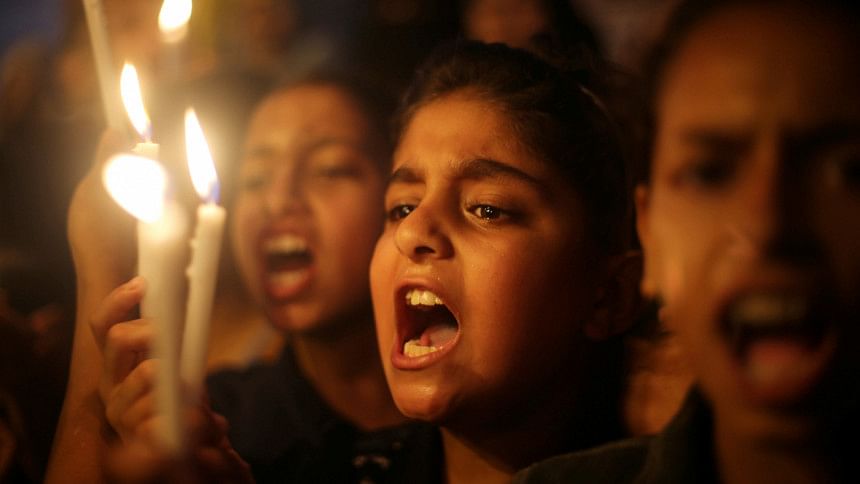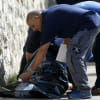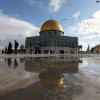Thousands of worshippers surge into Al-Aqsa, 113 injured

-- Chaotic scenes after Israel reverses security measures
-- 113 Palestinians injured in scuffles with Israeli police
-- Israel confirms all new security measures dismantled
-- Palestinian leaders had threatened "day of rage"
-- Tension at holy site has long stoked Middle East conflict
Thousands of Muslim worshippers surged into Jerusalem's Al-Aqsa Mosque on Thursday and at least 113 were hurt in scuffles with police after Israel lifted security measures imposed at the sacred site in the face of days of violent protests.
Chaotic scenes unfolded as Israeli police used stun grenades to try to control crowds charging forward when the last gate Muslims use to enter Al-Aqsa was opened after a stand-off lasting several hours.
"We will sacrifice ourselves for Al-Aqsa!" chanted the throng outside Islam's third holiest shrine. Several young men clambered onto the mosque's roof to affix Palestinian flags, which Israeli police soon confiscated.
Israel's removal of the security devices, including metal detectors and CCTV cameras, marked a significant climbdown by right-wing Prime Minister Benjamin Netanyahu. While Palestinians celebrated, political opponents accused him of weakness.
Netanyahu's decision followed days of diplomatic effort by the United Nations, the involvement of U.S. President Donald Trump's Middle East envoy and pressure from Muslim Arab powers in the region.
One of these, Jordan, continued to fume at Netanyahu over the shooting deaths of two of its citizens by an Israeli Embassy guard in Amman on Sunday. Israel repatriated the guard to a hero's welcome, saying he had fired in self-defence against an attack that may have been spurred by pro-Palestinian sentiment.
The Aqsa dispute erupted after Israel installed metal detectors at Muslim entrances to the compound, known to Muslims as the Noble Sanctuary and to Jews as Temple Mount, following the July 14 killing of two Israeli police guards by gunmen who had concealed weapons inside the walled plaza.
The unannounced move provoked days of unrest, with violent clashes on the streets of East Jerusalem. Israeli forces shot dead four Palestinians, and a Palestinian knifed three Israelis to death in a settlement home in the Israeli-occupied West Bank.
For the past two weeks, most Muslims refused to enter Al-Aqsa, instead praying in streets around Jerusalem's Old City.
Earlier on Thursday, the Waqf Muslim trust that manages the mosque declared itself satisfied that Israeli authorities had scrapped all the new security measures and reverted to the set-up before July 14. The Waqf urged Muslims to return to Al-Aqsa.
Palestinian political factions issued statements supporting the Waqf that looked likely to help defuse the unrest. Before the announcement, factions had been calling for a "day of rage" on Friday, raising concerns about another round of bloodshed.
Jordan, which signed a peace treaty with Israel in 1994 and has been custodian of the Muslim holy sites in Jerusalem since 1924, said Israel's removal of the extra security was an "essential step to calm the situation".
But, facing domestic outrage over the Israeli Embassy deaths, Jordan's King Abdullah excoriated Netanyahu for embracing the guard involved after demanding he return without being investigated.
Netanyahu's conduct had been "provocative on all fronts and enrages us, destabilises security and fuels extremism," Abdullah said in a statement, adding that bilateral relations were at risk if the guard were not brought to trial.
MULTI-FACETED ANCIENT DISPUTE
The Aqsa compounds sits on a tree-lined marble plateau in the heart of the Old City. It is also the holiest place in Judaism - the venue of two ancient temples, the last destroyed by the Romans. Jews pray under heavy security at the Western Wall at the foot of the elevated plaza.
The dispute, like many in the Holy Land, is about more than security devices, taking in issues of sovereignty, religious freedom, occupation and Palestinian nationalism.
Israel captured East Jerusalem, including the Old City and the holy compound, in the 1967 Middle East war. It annexed the area and declared it part of its "indivisible capital".
This has never been recognised internationally, with the United Nations and others regarding East Jerusalem as occupied by Israel and maintaining that the status of the city can only be determined through negotiations between the parties.
Palestinians do not recognise Israel's authority in East Jerusalem, which they want as the capital of a future Palestinian state, and are extremely sensitive to the presence of Israeli security forces in and around the Noble Sanctuary.
Palestinian political factions were quick to claim a rare victory over Israel after Netanyahu pulled the extra security measures. His aides declined to comment, but rivals in Israel's fractious right-wing camp criticised Netanyahu's decision.
"Israel is emerging weakened from this crisis, to my regret," said Education Minister Naftali Bennett, whose national-religious Jewish Home party is in Netanyahu's coalition and who is a potential challenger for the leadership.
"Instead of bolstering our sovereignty in Jerusalem, a message was relayed that our sovereignty can be shaken."
In ordering the metal detectors and cameras, Netanyahu had said the extra security was needed to ensure safety at the site.

 For all latest news, follow The Daily Star's Google News channel.
For all latest news, follow The Daily Star's Google News channel. 





Comments